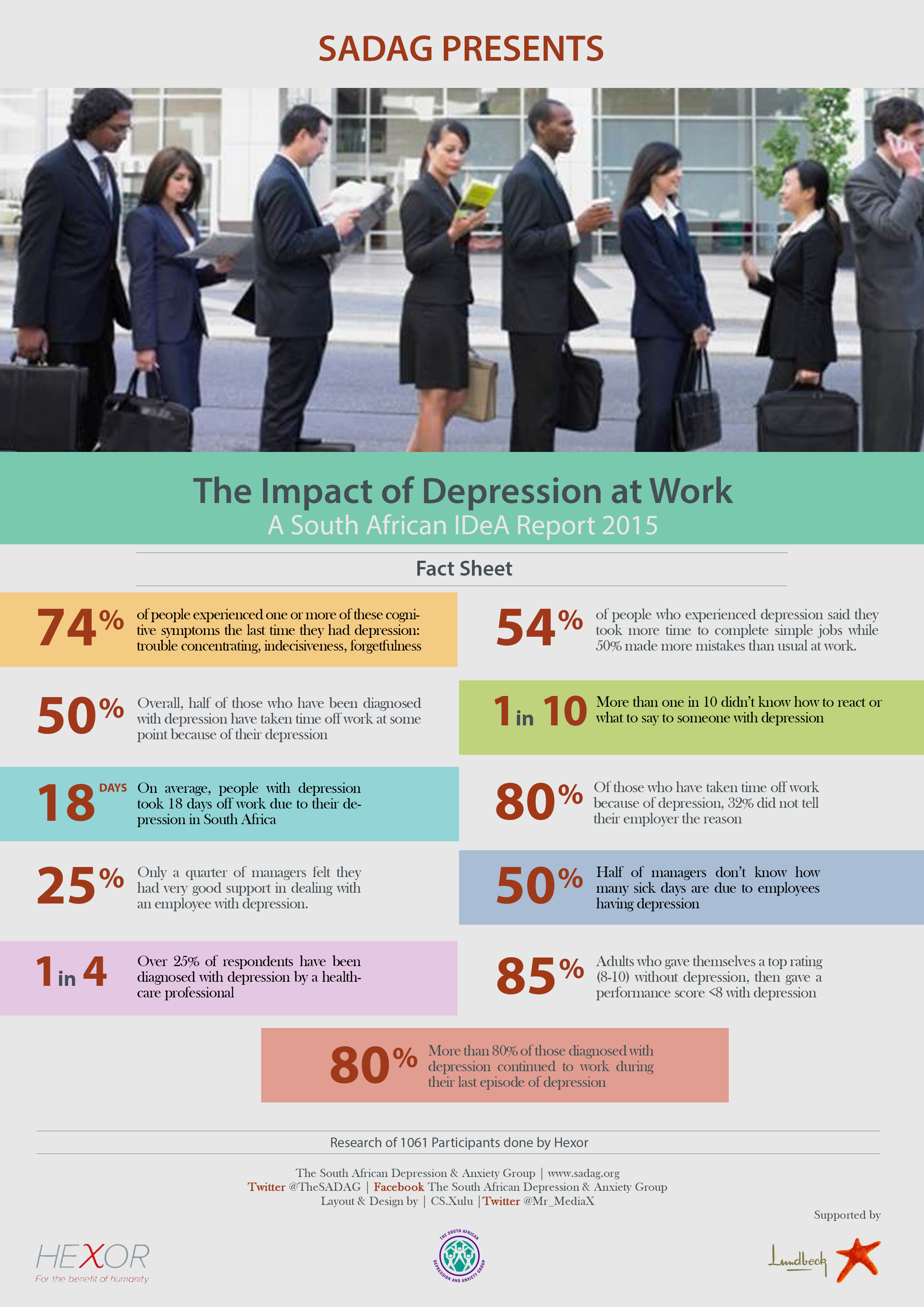
NEW STUDY IN SA WORKPLACE
Depression impairs employees’ intellectual functioning
Classified as a mood disorder, people mostly associate depression with sadness, loss of pleasure in daily activities, social isolation and feelings of worthlessness. Yet, aside from affecting how a person feels and behaves, depression also influences thinking.
New South African research involving over 1 000 employed/previously employed workers or managers in the country now proves depression is not just a bad mood. Although respondents showed a poor awareness of cognitive symptoms, 74% of them reported experiencing one or more of the following the last time they were depressed: trouble concentrating, forgetfulness, indecisiveness. According to nearly half of the participants with depression, the cognitive symptom that most affected their ability to perform work tasks as they normally would was difficulty concentrating.
COMMON COGNITIVE SYMPTOMS OF DEPRESSION
- Poor concentration
- Easily distracted
- Poor memory/forgetfulness
- Indecisiveness
- Slower thinking speed
- Problem solving difficulties
- Struggling to find the right words to express your thoughts
- Negative or distorted thinking patterns
“Depression affects cognitive functioning such as decision making, concentration, memory and problem solving abilities. Depression negatively impacts productivity. If an employee has depression but is at work, they are 5 times less productive than an employee who was absent due to depression,” says Psychiatrist and Clinical Psychologist, Dr Frans Korb.
Less than 20% of the employees taking part in the 2014 study associated forgetfulness and indecisiveness with depression, in contrast to sadness/low mood, which the majority identified as a symptom of depression. When it comes to recognising depression in the workplace, it seems SA workers would mostly look for withdrawal from colleagues, crying and extended sick leave as signs of its presence.
Despite rarely being a topic of discussion, the cognitive symptoms of depression tend to be quite debilitating and can affect all domains of a person’s life.
Diagnosed with depression, Greg* had this to say about his experience: “Trying to handle all my work responsibilities is very challenging for me, and it takes me a lot longer to get things done.
It’s like you can’t see the small steps, and you don’t have the energy to take big steps, so you feel stuck… trapped. At the end of the day, very little gets done. This kind of thinking makes it difficult to do any normal daily tasks, not just those related to work."
Employees who experienced cognitive symptoms rated their work performance with depression as worse off than those with depression who did not experience cognitive symptoms. This suggests that people who find their thinking more affected by the condition feel more incompetent at work than those who struggle more with a low mood or feelings of helplessness. Workers with cognitive symptoms were also more likely to have taken time off for their depression.
.
These findings highlight the issues of absenteeism in the workplace while ill, as well as continuing to work whilst ill, which then impacts severely on productivity.
During their last depressive episode, SA employees took an average of 18 days off work due to the condition. However, the recent study also showed that only half of those diagnosed with depression have taken time off work because of it. What could this say about the level of performance achieved by the other half who continued working, especially when considering the commonly experienced cognitive symptoms of poor concentration, forgetfulness and indecisiveness?
Operations Director of the South African Depression and Anxiety Group (SADAG), Cassey Chambers, says: “This is one of the reasons why it’s vital to examine how depression is managed in the workplace and what procedures are in place to ensure that affected employees are encouraged to and supported in seeking treatment.” With the help of Lundbeck SA, SADAG conducted the new research to gain a better understanding of how many South Africans making up the country’s workforce experience depression, how much awareness exists in the working world about the condition, and how the illness is managed in the workplace.
FIVE WAYS COMPANIES CAN HELP
- Educate employees on depression and especially how cognitive symptoms can affect work performance.
- Raise awareness of any existing employee assistance programmes AND emphasise that they can help with mental health problems, like depression, too.
- Promote a culture of acceptance around depression and other psychiatric disorders – they are no different to diabetes or asthma.
- If an employee shares their struggle with depression, refer them to a mental healthcare professional and reassure them the illness can be treated.
- Explore creative ways to support an employee’s recovery, like flexible/adjusted working hours or working from home for a while.
To find out more about the results of the new study, where to find professional help for depression and the associated cognitive symptoms, or to book a wellness day or corporate talk for your employees, contact Naazia Ismail at SADAG on 011 234 4837
*Name has been changed.


























